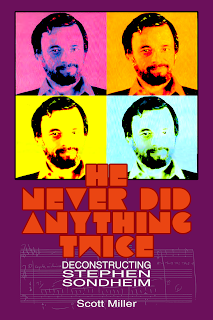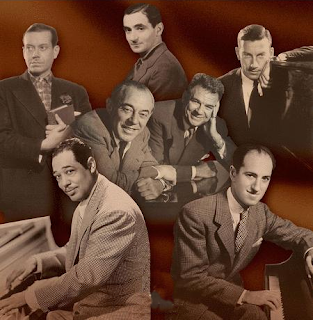Forum was only Sondheim's second full score as an adult, and it's the first that was actually produced. He had written lyrics for West Side Story and Gypsy, but here we could see for the first time the way Sondheim combines his words and music. In a lot of ways, Sondheim was still a novice, and Forum was a very strange experiment. Even this early in his career, Sondheim was already challenging himself.
The writing of Forum was a pivotal moment for Sondheim as a young composer and lyricist. To his death, he bemoaned the fact that the Forum script and score “didn’t go together,” but that’s the whole point of a mashup, taking two elements that shouldn’t work together and seeing how they do work together – look at Head Over Heels or Return to the Forbidden Planet.
And yet despite Sondheim’s struggle, his craft here is exceptional. Notice all the different kinds of rhymes Sondheim uses in this opening number, the aggressive wordplay, letting the audience know the show will be playing around with language all night. There are the expected perfect rhymes, of course:
Nothing that’s formal,
Nothing that’s normal.
But Sondheim also uses other kinds of rhyme, like chain rhymes, multiples of the same rhyme, all in a row. One famous example is the end of “On the Steps of the Palace” in Sondheim’s Into the Woods score. There are also examples in “Comedy Tonight.”
Tumblers!
Grumblers!
Fumblers!
Bumblers!
There are also interior rhymes, within a line:
Stunning surprises,
Cunning disguises…
There are head rhymes, another name for alliteration, in “Love, I Hear”:
I pine. I blush. I squeak. I squawk.
Today I woke too weak to walk.
Notice that the w sounds in “squeak” and “squawk,” nicely set up the alliteration in the following line. And notice that the words “woke,” “weak,” and “walk,” all start with the same consonant but also they all end with the same consonant. No matter how many Sondheim shows I work on, no matter how much I analyze and write about them, I am forever finding new treasure.
It's important to remember that "prefect" rhymes aren't the only kind of rhymes. A rhyme is just a relationship between two words. There are lots of different ways to explore that relationship. Here’s another great example of head rhymes or alliteration, from the Forum song “Pretty Little Picture”:
The sand and the sea and the stars in the sky,
And the sound of a soft little satisfied sigh.
There are slant or imperfect rhymes in Forum's opening number:
Something familiar,
Something peculiar,
Something for everyone, a comedy tonight.
Something appealing,
Something appalling…
There are multisyllabic rhymes:
Something convulsive,
Something repulsive…
There are apocopated rhymes, one word rhyming with a just part of another:
Frenzy and frolic,
Strictly symbolic.
and also…
Something that’s gaudy,
Something that’s bawdy,
Something for everybawdy…
This second example is also a transformative rhyme, which conspicuously and comically alters the pronunciation of a word to make the rhyme work. This kind of thyme is found all through Gilbert & Sullivan’s comic operas, and in the lyrics of Yip Harburg, who co-wrote the Wizard of Oz score.
There are lots of examples in Forum of consonance, a kind of alliteration inside words (also used, to great comic effect, in the song “Gary, Indiana” in The Music Man). We see a great example in the Forum song, “Free”:
It’s the necessary essence
Of Democracy!
There's also assonance in the opening, the repetition of vowel sounds, regardless of the consonants:
She plays Medea
Later this week.
And it’s not just the long e sound here, but also the long a sound in “plays” and “later.”
And the audience doesn’t know it yet, but the phrase “tragedy tomorrow” in the opening song is a sly set-up for a joke that won’t payoff till the finale, when Senex describes his redeemed marriage as “tragedy tonight.”
In interviews, in correspondence, Sondheim always came across as a very serious, very intense, very intellectual guy. And yet he could write a bawdy joke as well as anybody. Just look at his song "I Never Do Anything Twice," written for the film The Seven Percent Solution; or "Can That Boy Foxtrot," cut from Follies.
Oscar Hammerstein believed the audience shouldn't be aware of the lyricist, that they should hear those words as coming from the character. That's true to some extent, but the audience knows they're watching a musical and they know somebody wrote these lyrics.
Hammerstein's method isn't the only way to think about writing theatre lyrics. Some of the art form's great lyricists -- Ira Gershwin, Larry Hart, Cole Porter, Irving Berlin, and others -- didn't worry about that stuff. They just wrote fun songs that fit the moment. When you hear "You're the Top" in Anything Goes, it's impossible to ignore Cole Porter's playful touch.
It's very cool to see that young Sondheim, having been taught to write lyrics by Hammerstein, could switch to a completely different way of working and writing -- and do it so well!
This is the eighth Sondheim show I've directed. Uncle Steve is no longer with us, but he left us so much to explore!
Long Live the Musical!
Scott
To buy your tickets for A Funny Thing Happened on the Way to the Forum, click here.
To buy your New Line season tickets for next season, click here.
To donate to New Line Theatre, click here.
To check out my newest musical theatre books, including my latest, He Never Did Anything Twice: Deconstructing Stephen Sondheim, click here.



No comments:
Post a Comment